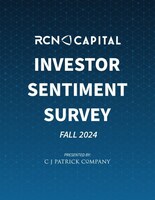The RCN Capital/CJ Patrick Company Investor Sentiment Index™ (ISI) tracks the pulse of real estate investors across the country and gauges their market outlook based on their responses to four key questions:
- Current Market Outlook - How does the environment for residential real estate investing compare to one year ago?
- Future Market Outlook - What's your outlook for residential real estate investing over the next 6 months compared to today?
- Expected Home Price Increases - What do you expect home prices to do over the next 6 months?
- Number of Properties Compared to Past 12 Months - How does the number of properties you plan to invest in over the next 12 months compare to the number of properties you've invested in over the past 12 months?
"Investor sentiment is almost twice as positive today as it was in the third quarter of 2023, and they're even more optimistic about the future," said RCN Capital CEO Jeffrey Tesch. "It seems likely that investors are reacting to improving market dynamics – financing costs declining, the inventory or homes for sale increasing dramatically, and home price appreciation slowing down, but still rising."
Cost and Availability of Insurance a Growing Problem
The Fall 2024 Investor Sentiment Survey from RCN Capital, conducted by market intelligence firm CJ Patrick Company, again highlighted growing concerns among investors about increasing insurance costs or the unavailability of insurance in markets subject to frequent extreme weather events like Hurricane Helene. Almost 80% of the respondents said that concerns about the cost and availability of insurance was a factor in their decision-making about investing in real estate. This was more prevalent among flippers (82.9%) than among rental property investors (69.4%). This could be because insurance issues have caused more flippers (73.3%) than rental investors (45%) to miss out on a deal.
In states where extreme weather events have caused insurance rates to soar and prompted some insurance companies to exit the state, the responses were even more telling. Almost 97% of California investors and over 93% of Florida flippers said insurance issues were a factor in their decision-making. Similarly, over 85% of California rental property investors and 90% of Florida rental investors said the same. California flippers were more likely to have missed out on a deal due to insurance matters than rental investors: 87.5% of flippers lost a deal compared to 50% of rental investors. On the other hand, 60% of both flippers and rental investors missed out on a deal due to insurance problems in Florida.
Squatters also appear to be a problem that won't go away: over three-quarters of respondents – 77% - said that squatters were a problem in their area, with 43.6% experiencing the problem personally. The problem appears to be much more severe among flippers (who probably buy more properties that are supposed to be vacant) than rental investors. Almost 88% of flippers cited squatters as a problem compared to 54.9% of rental investors.
The issue is also apparently more commonplace in California than Florida, although it's bigger in both states than it is nationally: 93.8% of California flippers and 70% of California rental investors said squatting is a problem compared to 86.6% and 60% respectively for Florida investors.
Flippers More Optimistic Than Rental Investors – but More Concerned About a Recession
Fix-and-Flip investors were significantly more positive about market conditions than were rental property investors. Over 80% of flippers believe that market conditions have improved over the past year, and more than 83% expect things to continue to improve. Conversely, under 47% of rental property investors believe that today's market is better than last year's, and about 51% expect conditions to improve over the next 6 months. It's worth noting, however, that both responses from rental investors were significantly higher than they were in the Summer 2024 survey.
Investors overwhelmingly believe that home prices will continue to rise: 70.6% of all respondents, 74.2% of flippers, and 58.5% of rental investors agree. Most also believe that the country is likely to enter a recession in 2024, with 63.2% of all respondents answering affirmatively. But there's a stark difference between flippers and rental investors in this category, with only 38.7% of rental investors calling for a recession compared to 74.7% of flippers.
Harris Seen as the Likely Victor in Presidential Race
The investors surveyed predict a victory in November for Kamala Harris by a fairly wide margin, 51.4% compared to 40.5%. When asked which candidate would create the best environment for real estate investing, Harris again was cited more often, 47.2% to 39.2%. There were some surprises, however, in the underlying data. Investors in California expect a Trump victory in November: Flippers by 62.1% to 34.5%, and rental investors by 70% to 30%. Florida investors are split: Flippers expect a Harris victory 60% vs. 33.3%, while rental investors predict a Trump win 65% to 30%.
Nationally, flippers appear more confident in Harris creating the better investing environment than Trump by 56.9% to 32.6%. Florida flippers have almost identical expectations – 60% to 33.3% - but California flippers cite Harris by a narrower margin – 50% to 40%.
Rental property investors across the country are more favorable to the former President, with 45% of the respondents saying Trump would create the best investing environment compared to 39.6% for Harris. Only 25% of Florida's rental investors believe Harris would create the best environment compared to 55% for Trump. Rental investors from Harris' home state of California say Trump would create the better environment for investing 75% to 25%. And while rental investors nationally give the election to Harris over Trump by a narrow 50% to 45.5%, Trump is deemed the likely winner by rental investors in both Florida (65% to 30%) and California (70% to 30%).
"Survey respondents told us that a Harris Administration could create a more robust environment for investing, despite some proposals – like raising the capital gains tax – and policies being pursued by the Biden Harris Administration, such as rent control and limiting tax benefits for owners of 50 or more rental properties, that seem to be inherently anti-investor," said Rick Sharga, CJ Patrick Company CEO. "It could be that investors are optimistic about the Harris campaign's initiatives focused on strengthening the housing market overall, and believe that those policies might benefit investors, tenants, and homebuyers alike."
High Cost of Financing Still Cited as Biggest Challenge
The high cost of financing continues to be the most frequently cited challenge by investors, as it has been since the inception of the survey, being noted by 63% of the respondents. Lack of inventory was cited just under 40% of the time, and rising prices were cited 36.5%. Competition from investors (43.6%) and homebuyers (32.8%) rounded out the top five biggest challenges.
Perhaps due to declining mortgage rates and the recent rate cut by the Federal Reserve, investors believe that financing challenges might improve a bit: 52.5% of the respondents expect the high cost of financing to be among their biggest challenges 6 months from now (a drop of 10 points). Competition from large investors is expected to increase, being cited by 46.3% of the investors. Low inventory (40.5%), competition from homebuyers (32%), and rising home prices (31%) are also expected to be challenges in the future.
Flippers and rental property investors had similar views on challenges both today and in the future, with one notable exception. Rental investors cited cost and availability of insurance as a major challenge today 30.6% of the time (the fourth most cited challenge) compared to only 17% by flippers. Both noted that the high cost of financing was their biggest challenge today – and would continue to be 6 months from now – and mentioned competition from investors and homebuyers, lack of inventory, and rising home prices as their other major concerns.
About RCN Capital
RCN Capital is a South Windsor, CT-based national, direct, private lender. Established in 2010, RCN provides commercial loans for the purchase or refinance of non-owner-occupied residential properties. The company specializes in new construction financing, short-term fix & flip and bridge financing, and long-term rental financing for real estate investors. For more information on RCN Capital and RCN's loan programs, visit www.RCNCapital.com.
About CJ Patrick Company
Founded in 2019, CJ Patrick Company is a Market Intelligence and Business Advisory firm working with companies in the real estate and mortgage industries. Visit www.cjpatrick.com for more information.
About the RCN Capital/CJ Patrick Investor Sentiment Index™ (ISI)
The RCN Capital/CJ Patrick Investor Sentiment Index™ (ISI) was designed to track the pulse of real estate investors across the country and gauge market outlook. The ISI is based on a quarterly survey of residential real estate investors and focuses on their responses to four specific questions:
- Current Market Outlook - How does the environment for residential real estate investing compare to one year ago?
- Future Market Outlook - What's your outlook for residential real estate investing over the next 6 months compared to today?
- Expected Home Price Increases - What do you expect home prices to do over the next 6 months?
- Number of Properties Compared to Past 12 Months - How does the number of properties you plan to invest in over the next 12 months compare to the number of properties you've invested in over the past 12 months?
More detailed methodology available upon request
SOURCE RCN Capital









Share this article